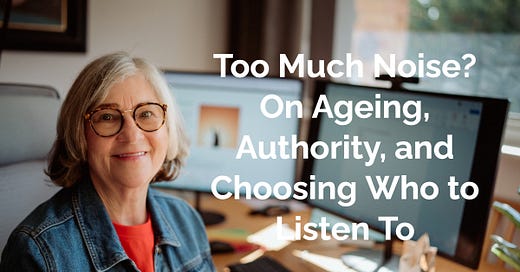I spent the day visiting my mum. She’s 92 now and has been living in an over-55s complex for around 25 years. She moved there at my age, 67, and as we talked, it got me thinking about how much has changed in the way we talk about ageing.
Back then, her information about later life came mostly from women’s magazines. Woman’s Weekly, Woman’s Own, The People’s Friend, maybe even Cosmopolitan or She on occasion. But very few of these publications really spoke to what it meant to grow older as a woman. There were recipes, household tips, romantic advice, but ageing itself? That was rarely discussed. And when it was, it usually came wrapped in a kind of “ageing gracefully” language, coded for being quiet, modest, appropriate.
Fast forward to today and the landscape looks completely different.
We are surrounded by conversations about ageing: podcasts, Substack newsletters, books, blogs, Instagram reels, TED talks, celebrity columns, anti-ageing ads, wellness influencers, longevity tech founders … It’s an explosion of voices and perspectives. And in many ways, it’s a gift, ageing is finally being seen and spoken about, no longer hidden away.
But it’s also… a lot.
We are being told to age boldly. To age beautifully. To age like rebels. To slow down. To speed up. To launch a business at 65. To run a marathon at 75. To do more. Be more. Give more. Look younger. Feel fabulous. Redefine everything.
And it can be exhausting.
It made me wonder: how do we know what’s useful? Who gets to speak with authority? And how can we be more discerning in what we take in?
Because not all of these voices are grounded in research. Many are opinion pieces, well-meaning, sometimes inspiring, but still anecdotal.
Others are driven by commerce, offering solutions to problems we didn’t know we had, often with a product attached. And some perpetuate the same old pressures: to look good, stay productive, and keep performing, just in older bodies.
That’s why I do what I do; and why I think it matters.
I came to this work not just from lived experience, but through academic research. I earned my Doctorate in Psychology at 64, studying how people create meaning in life after full-time work. My last book, Rethinking Retirement for Positive Ageing was based on my doctoral research. I take this further with two books out later this year: Career Coaching for Midlife and beyond and Thrivespan – a model for later life. And plans for a trilogy to follow.
My writing draws on academic evidence, real-life stories, and decades of coaching practice. I want to offer something deeper than the latest trend. Something honest, thoughtful, and grounded.
Interestingly, two people both under 35, told me this past week that I’m a role model for ageing well. That meant a lot, not because I’m trying to be one, but because I’m simply living life on my terms: no makeup, grey hair, slow days, deep work. and at times lost in a crowd and loud music. And that’s not invisibility. That’s presence.
I know I’ve never been considered beautiful by society’s standards, and I sometimes wonder whether that’s made ageing easier for me. I’ve never built my identity around looks or sexual appeal, so I haven’t had to grieve their loss. But I do see how hard that can be for others, especially when so many messages about ageing still come wrapped in appearance-based ideals.
So, here’s what I want to say:
It’s a wonderful time to be older and curious.
But we don’t have to take it all in.
We get to choose.
We get to be discerning.
We get to slow down when we want, and speed up when it feels right.
We get to model this stage of life not only for ourselves, but for those who follow.
And maybe that’s enough.
A question
There are so many voices speaking about ageing these days; some helpful, some not. What voices do you find yourself drawn to? What truly resonates, and what feels like noise? I’d love to hear your thoughts.





Thank you. I love that you write from the heart and do not idealise how to age. You are on the same wavelength as me. Tell it as it is, not as we are led to believe. Taking the shoulds out of it all.
I think we are hearing a lot more about ageing these days, because the boomer generation has the means with technology. But also we experienced such vast changes over our lifetime. From “love” in the 60’s to a vast means of reading and research.
If only all of the knowledge and experience could be put into the minds of those in government and who whoever controls the means to make life easier for us all.
The generation that made a noise as youth has continued to make a noise now they have grown into being ageing boomers. I am glad that our generation is raising its voice for the benefit of older people. I have already enjoyed older years that were far more interesting than the accepted roles of my parents' generation. I want to continue to do so and to continue to enjoy the years that remain. So I am particularly interested in how we can maintain good physical and mental health. Yes, ageing takes its toll, so maybe we can't run a marathon. But some do - not something our parents would have considered doing. I'm the first to cheer them on. But burn out is just as possible for those of us who choose more competitive or more energetic roles as we age, as it was for those who chose to be superwoman in their middle years. Acceptance of our new limitations is a lesson that some of us still have to learn.
I look forward to your new books. We have so much we can learn from you. More power to your writing elbow, Denise.